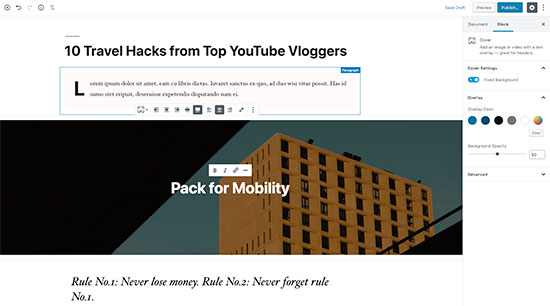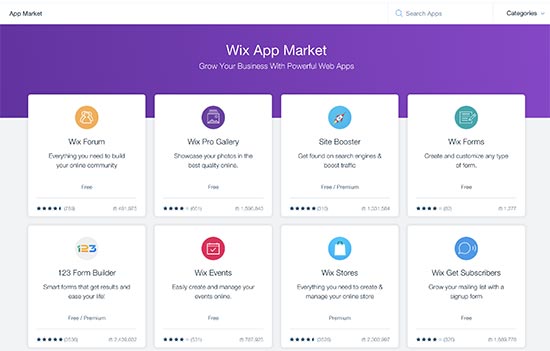Do you hesitate to choose between Wix and WordPress to create your website? Although WordPress is the most popular website system in the world, it is not the only option. Wix is another popular form of website builder that allows you to easily build a website.
In this article, we'll compare Wix to WordPress and highlight the pros and cons of each. We hope this review and comparison help you decide which platform is right for you.
Note: This article compares Wix and WordPress.org in hosted mode, NOT WordPress.com
We have identified in this comparison 5 axes: Let's see how Wix and WordPress overlap in each of these categories.
Prices and costs
The cost of building a website is an important factor when choosing your platform. The total cost of developing and maintaining your site will depend entirely on your needs. Our goal is to make sure you can do everything you need within your budget.
Let's compare the prices of Wix and WordPress to find out which one gives you the most bang for your buck.
Wix:
Wix offers a basic website builder for free. However, there are two major downsides to this. First, it adds Wix branded advertisements to the top and bottom of your website.
Second, you cannot use a custom domain name for your site. So your site address will be username.wix.com/sitename.
Apart from that, the basic plan does not offer necessary add-ons such as Google Analytics, Favicons, eCommerce, etc. To remove ads and get additional features, you need to upgrade to one of the premium plans offered.
Each premium Wix plan has different storage and bandwidth limits. You can pay monthly or choose an annual plan.
The best plan on Wix is the Unlimited plan ($12.50/mo) and if you want an eCommerce store, you need the eCommerce plan ($16.50/mo).
This cost does not include applications that you later choose to use on your website.
WordPress:
WordPress software is available for free to everyone. We are often asked why WordPress is free and what's the catch?
Well, the biggest problem is that you need your own domain name and your own web hosting to install it. There are several WordPress hosting providers you can choose from.
Depending on your budget, you can start with a basic package offered by a WordPress hosting provider like Bluehost or OVH, which will cost you around $2 or $3 per month and includes a free custom domain name. If your budget allows, you can use a managed WordPress hosting provider.
The cost of a WordPress site will increase if you decide to use premium WordPress themes or plugins. However, there are thousands of free WordPress themes and plugins you can use to cut costs. You can add any functionality to your WordPress site using a plugin without upgrading your hosting plan.
Conclusion:
WordPress beats Wix with flexible plans available from a variety of web hosting companies. The cost depends on the number of resources you use and you are free to use your WordPress site as you see fit.
Most beginners don't want to spend too much time learning new skills. Both Wix and WordPress allow you to create websites without learning to code.
Ease of use
Wix:
Wix comes with powerful and easy-to-use tools to create your own website. It offers a simple drag-and-drop interface where you can select any element on your site and start editing it in a WYSIWYG interface.
You can drag items anywhere on your site, rearrange items on your pages, write content, and add media in a user-friendly environment. Many beginners will find this feature beneficial as it will save them from dealing with code.
WordPress:
WordPress comes with a visual editor to write your content and a customization tool that lets you edit your theme properties in a WYSIWYG environment. However, by default, WordPress does not come with a built-in drag-and-drop page builder.
To get full control over the look, users need to be familiar with different sections such as navigation menus or visual post editor, etc. This means that WordPress requires a small learning curve for beginners.
On the other hand, there are thousands of themes that make customization easy.
Conclusion:
Wix is the clear winner here. Users don't need to spend a lot of time learning the platform or installing plugins before they can build their website.
On the other hand, they will need to understand the basics of WordPress and may need to install plugins to build their site.
However, you can use powerful WordPress page builders like BeaverBuilder or Divi, which offer much more power than the standalone Wix builder.
Design and layout
The design and layout of your site play an important role in your success. Every site owner needs a design that's both aesthetically pleasing and user-friendly that sets their brand apart from the competition.
Wix:
Wix comes with over 500 pre-made templates. All Wix templates are fully responsive and written in HTML5. Using the built-in tools, you can further customize your site's design, change the layout, and rearrange the elements to your liking.
There are templates available for each type of site. The templates are divided into categories like business, e-commerce, hobbies, crafts, personal, and more.
A big downside is that once you've selected a template, you can't change it. You can modify and customize it as many times as you want using only the built-in tools but you cannot switch to another template.
WordPress:
Thousands of free and paid themes are available for WordPress. Free themes have limited support but they also go through a strict review process. Paid themes usually offer more features and come with premium support options.
WordPress themes range from small personal sites to full-fledged e-commerce sites. Most themes have built-in customization options. You are also free to customize them further using your own themes and plugins.
Users can download free themes from the WordPess.org directory. For paid themes, there are several WordPress theme shops such as Themify, CSSIgniter, StudioPress, etc.
Additionally, you can hire a developer or learn how to create a completely custom theme for your business.
Conclusion:
WordPress offers a much wider range of themes and design layouts than Wix. WordPress users can also easily change themes or customize them as many times as they want without any restrictions.
Flexibility: Plugins and Apps
Plugins and apps are third-party extensions that you can use with your platform to add more functionality. Wix calls them apps and in the WordPress ecosystem, they are called plugins.
Let's compare the apps and plugins available on both platforms and what you can do with them.
Wix:
Wix comes with nearly 200 apps that you can add to your site. These apps offer a wide range of features such as adding contact forms, galleries, comments, email lists, and more.
Most apps are free or lite. Other apps require monthly payments and vary in price. Although the collection of apps is limited, they cover the most requested features by site owners.
WordPress:
As of this writing, over 55,000 free plugins are available in the WordPress.org plugin directory alone. All this without mentioning the premium plugins available in other markets.
The saying goes: if you can think of it, there's probably a WordPress plugin that makes it possible.
Whether you want to create a contact form, install Google Analytics, create a membership website, or sell online courses, there's a plugin for it.
You can do just about anything you like with WordPress. There are many free and paid plugins that you can use right away on your site.
Conclusion:
WordPress easily beats Wix in this area as well. Even though Wix's app library is growing, it's still limited compared to the vast choice available to WordPress users.
E-commerce features
Selling products online is another important feature that most newbies are looking for. Let's see how WordPress and Wix compare in e-commerce.
Wix:
Wix offers e-commerce with its paid plans. This means that users on the free plan cannot run their online store on Wix without going to a paid plan. With WixStores, you can only accept payments through PayPal or Authorize.net.
There are a few third-party apps that you can use to sell items online but these apps would cost you even more with their monthly fees. All this without starting to take into account your payment gateways and your limited functionalities.
WordPress:
WordPress makes it super easy to build your online store using WooCommerce, which powers over 42% of eCommerce websites worldwide. There are also many other e-commerce plugins available for WordPress that you can use to sell goods, services, events, subscriptions, etc.
Most eCommerce plugins for WordPress even have their own dedicated themes and there are plenty of themes specifically designed to work with these plugins.
Conclusion:
If you want to build a proper online store and be ready for growth, WordPress offers a lot more flexibility, freedom, and choice compared to Wix.
Summary of the comparison
WordPress is far superior to Wix as a web publishing platform for any type of website. Although Wix offers an easy-to-use website builder, you can accomplish so much more with WordPress in the long run.
The choice, therefore, depends on the stage of progress of your project, so the ideal is to start with Wix when you have few resources and little knowledge, then switch to WordPress as soon as your needs grow.
It should be noted, however, that for important needs to create an online store, we recommend switching to systems like PrestaShop or Magento.
WordPress/WooCommerce is a very good system in the case where we limit ourselves to basic and personal needs, but as soon as the needs become more professional, we then recommend adopting expert e-commerce systems.
In general, to start, it is very good to start with systems like Wix, on the one hand, to validate your concept and your business model, and on the other hand not to invest too much at the beginning and to be able really to invest when you have verified that your project works.
From there, your needs will grow and you will necessarily need systems over which you can exercise more control and which you can customize to your exact needs, with WordPress, Drupal, or Prestashop.
We hope this article helped you compare Wix to WordPress and learn the pros and cons.
READ MORE: How To Create A Website - The Complete Guide











0 Comments